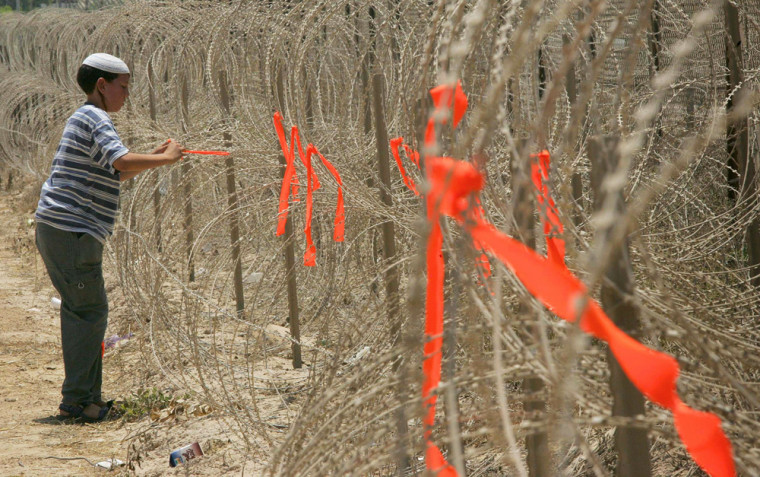Teen girls singing, jotting down their thoughts and splashing water from a hydrant: it might have seemed an innocent display of carefree youth, except for the prison setting and the hateful tone of the chants and graffiti.
The 14 girls, still under arrest Monday after violent protests last week against Israel’s planned Gaza withdrawal, compared Prime Minister Ariel Sharon to Nazi leader Adolf Hitler. They scrawled “Death to the Arabs” on cell walls and poured water into the prison courtyard, declaring they wanted to waste taxpayers’ money.
“It’s the first time we’ve seen any like this, so many children here for ideological reasons. In my 28 years of experience, I’ve also never seen children behave like this,” said Rami Ovadiah, head of Massiyahu prison, where 63 minors are held.
Contemptuous of government authority and intent on thwarting Israel’s pullout plans, youngsters from across the country have emerged as the impassioned foot soldiers in an increasingly extreme battle. In recent weeks, they have poured oil and nails onto a highway, blocked roads, commandeered buildings and scuffled with troops.
Adolescent warriors
Fresh-faced young girls in the flowing skirts of the religiously observant and young boys in skullcaps, jeans, T-shirts and sandals are now a familiar presence on roads and anti-pullout rallies. Newscasts often relay images of adolescent protesters tussling with soldiers.
Raised as second- or third-generation settlers in isolated Jewish communities in the West Bank and Gaza, theirs is a potent mixture of wariness toward outsiders, surety of youth and uncompromising belief in the Jewish biblical right to land Palestinians seek for their state.
“It seems more important to stand up for Gush Katif (the Gaza settlement bloc) than to go to prison for a short time,” Hanna Tzomer, 18, said at a Jerusalem road demonstration last week.
Protesters arrested in recent weeks include a 13-year-old held for 35 days after refusing to identify herself, and two teenage girls jailed for blocking a highway. The Supreme Court barred the pair from taking matriculation exams in prison.
‘Illegal, wild activities’
On Sunday, police arrested an 18-year-old West Bank settler for attacking a Palestinian youth during a confrontation in Gaza last week. Israeli teens threw rocks at his head as he lay unconscious and bleeding.
“The level of young people getting involved in illegal and wild activities is an increasing phenomenon,” Israeli police spokesman Avi Zelba said.
So far, the efforts of the young withdrawal opponents have proved largely counterproductive, with an increasing number of Israelis expressing disgust with their tactics and support for the pending withdrawal.
A poll in Israel’s Yediot Ahronot newspaper last week showed support for withdrawal rose from 53 to 62 percent while opposition dropped from 38 to 31 percent. Pollsters attributed distaste for the growing violence for the shift in public opinion.
Settlers approve
However, settler leaders have applauded the youngsters. “They’ve been educated all their lives — this is their land. It’s an example of good education if they’re ready to pay the price and even be arrested through nonviolent civil disobedience,” said Eran Sternberg, a Gaza settler spokesman.
Others accused adults of manipulating their offspring, drawing parallels with parents of Palestinian minors who took to the streets during the recent uprising against Israel and, on rare occasions, acted as suicide bombers.
“An entire generation of Palestinian children was messed up by terror,” Nahum Barnea wrote in the Yediot Ahronot daily. “An entire generation of settler children was messed up by years of being educated to break the law, and is now being messed up by a wild, blind battle against state authority.”
Adventurism, free time and demography — one third of Israel’s population and close to half of Gaza’s Jewish settlers are under 18 — also play a role.
“The children are looking for action,” the Maariv newspaper declared.
Ideology starts young
But the teenage rebellion is also the product of a society in which political and religious lines are drawn early. Youth groups affiliated with a range of political ideologies are a traditional feature of Israeli childhood.
“Mobilization starts at a young age in the framework of youth movements that leads to the creation of collective identity,” said Gadi Wolfsfeld, a political science professor at Jerusalem’s Hebrew University.
Peer pressure also may be a factor.
“Many of the children are scared and want to go home. But they are afraid that if they do, especially if they have helped identify other people, their friends will hurt them,” said Ovadia, head of Massiyahu prison.
Code of behavior
The recent violence has prompted Jewish settler leaders to draw up a new code of behavior that includes nonviolence and verbal restraint against security forces.
Despite that, Wolfsfeld warned some youngsters could have future trouble with the law.
“Some will be alienated, some will be disillusioned but get over it, some will come back for a second round when something like this happens again,” he said, “and some might well become Jewish terrorists.”
